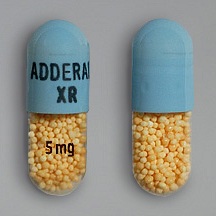By Wendy Bailey
Adderall is one of the most frequently prescribed drugs in the United States, and that fact along with many who can develop allergic reactions to the active ingredients in Adderall make Adderall a potential dangerous prescription drug when not used responsibly. We hope to help you assess the effects of Adderall (which can also be addictive) and evaluate the benefits and risks for yourself.
What is Adderall?
Adderall is a psycho-stimulant that affects the chemicals in the brain which contribute to impulse control and hyperactivity. Adderall is frequently prescribed to treat narcolepsy and attention deficit hyperactivity disorder (ADHD). Adderall can also be prescribed in rare cases to obese patients or to those suffering from depression.
Side effects of Adderall
No medication comes without the possibility of side effects, and Adderall is no different. There are a number of minor side effects of Adderall that are said to be very common. These side effects include:
- constipation
- diarrhea
- dizziness
- dry mouth
- feeling light headed
- insomnia
- loss of Appetite
- nausea
- upset stomach
- vomiting
As stated above, these side effects are relatively common and are mostly minor inconveniences. Consult your doctor if any of these side effects persist or become overly bother some. And know that doctors do not prescribe Adderall for weight loss, but it appetite suppression is also expected when you take this medication (even in kids!).
More serious side effects of Adderall
Adderall also carries with it the risk of more severe side effects. Some of these include:
- blurred vision
- changes in libido or sexual ability such as erectile dysfunction
- changes in mood such as increased aggression, anxiety, delusions, or depression
- chest pains
- confusion
- extreme weight loss
- fainting spells
- irregular heart beat
- numbness in the limbs
- painful urination
- seizures
- severe allergic reactions such as itching, hives, shortness of breath, swelling of the face, lips, or tongue, or a rash.
- severe headache
- severe stomach pain
- tingling in the limbs
If you experience any of these side effects, consult your doctor immediately. And if you mix alcohol and Adderall, side effects can be worsened and can result in alcohol poisoning or seizures.
Adderall overdose
Adderall is obviously a very dangerous drug to take recreationally, and an overdose can be fatal. Signs of an Adderall overdose include sudden hyperactivity,rapid breathing, uncontrollable shaking, violent mood swings, and hallucinations. 911 should be called immediately if you or anyone else on Adderall begins to exhibit these symptoms.
Adderall contraindications
Adderall should not be taken by anyone who has used an MAO inhibitor in the last 14 days, as serious life-threatening side effects can occur. Examples of MAO inhibitors include:
– Isocarboxazid (Marplan)
– Phenelzine (Nardil)
– Rasagiline (Azilect)
– Selegiline (Eldepryl or Emsam)
– Tranylcypromine (Parnate)
Furthermore, patients should not take Adderall if they have heart disease, high blood pressure, glaucoma, hardening of the arteries, an overactive thyroid,or a history of alcohol or drug abuse. Taking stimulants such as Adderall can be especially dangerous for those with congenital heart defects or other serious health problems as they can cause sudden death in these patients. This is especially true for children and adolescents. Long term Adderall use can also slow a child’s growth. If you are the parent of a child on Adderall and your child is not growing or gaining weight, consult your doctor immediately.
Suggestions for taking Adderall
Adderall is clearly not a drug to be taken lightly. Doctors often prescribe the drug in small doses to see if there are any adverse reactions before prescribing larger, more effective doses. As always, be sure that your doctor has your full medical history before he or she even considers prescribing the medication.
—








